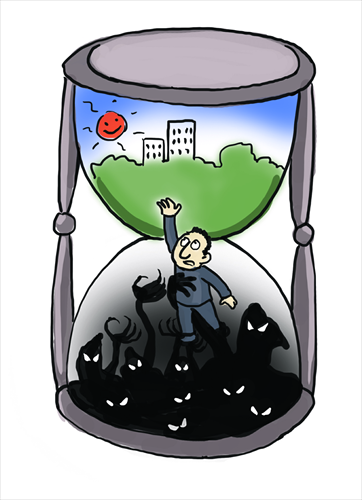Poisonous divisions fostered France’s young terrorists

Illustration: Liu Rui/GT
The world is reeling after the attacks on the satirical magazine Charlie Hebdo in Paris last week, which killed 12 people, and the subsequent hostage crises at a warehouse and a kosher supermarket, in which more innocents died.
Metropolitan France has not known a spasm of terror like this since the attacks by the OAS, a far-right terror group, in the early 1960s. On Sunday, over 1.5 million people rallied for the Republic and against terrorism in Paris, including leaders from more than 50 European, North African, and Middle Eastern countries.
Obviously, this terrorist attack in French metropolitan territory is changing the continent's political scenario. Anti-terrorism will be without doubt the first priority for France and EU in the foreseeable future.
It is true that this terrorist attack in Paris concerns Muslim terrorists, an avowedly atheist magazine, and the deliberate targeting of Jews. It is also true that France, a traditionally Christian but today aggressively secular country, has the largest Muslim community and Jewish community in Europe. Around 8 percent of the French population is Muslim, the highest percentage in Western and Central Europe.
But this does not mean that religious conflict is worsening. Based on the academic literature, terror and religious belief are not statistically correlated. Many recent terrorist movements, from ETA to the Tamil Tigers, have been avowedly secular.
This is also justified by the clear message sent and reiterated by different French and European Muslim communities in recent declarations: These terrorists can not represent their religion at all.
We should focus more on the likely correlation between terror and the harsh economic circumstances of young people in France and in the EU, and on deep-seated social "integration" problems.
These young terrorists were not born criminals. They were rejected step by step by society while extremist organizations at first attracted and absorbed, then re-educated and radicalized them before finally thoroughly manipulating these young people.
The chief attackers, the Kouachi brothers, were unemployed for a long time before meeting their extremist "mentor" who financed them. It was almost the same for the supermarket attacker Amedy Coulibaly who even asked then French president Nicolas Sarkozy for help in his job-hunting when he was received as part of a delegation of 500 young people at the Elysées Palace on July 15, 2009.
The youth of France's banlieues ("suburbs") are forgotten by society. Even though they are the second generation of immigrants, they are not yet well integrated. Of course, neither unemployment nor living in the banlieues is the reason to go to extreme, the radicalization of these young people is in fact the result of different successive factors accumulated over time.
What's the solution then? The anti-terrorism policy is essential to ensure the security and stability of French and European society, but economic growth should not be neglected. Although the second largest economy in the eurozone, France only saw 0.1 percent growth in the fourth quarter last year, and the yearly growth was only 0.4 percent in 2014, lower than the expected 1.0 percent.
The recent terrorist attacks reflect profound problems of the French, and even European social structure. It is not between different people of different religions, but between different people of different classes, the "mainstream society" versus the "forgotten society."
Given the number of immigrants with their specific customs and religions, economic growth is the foundation to ensure the security and stability of society. I believe the most effective form of integration can be found in the workplace, through meaningful and stable jobs.
The author is secretary-general of the Paris-based China-France Association of Lawyers and Economists. opinion@globaltimes.com.cn